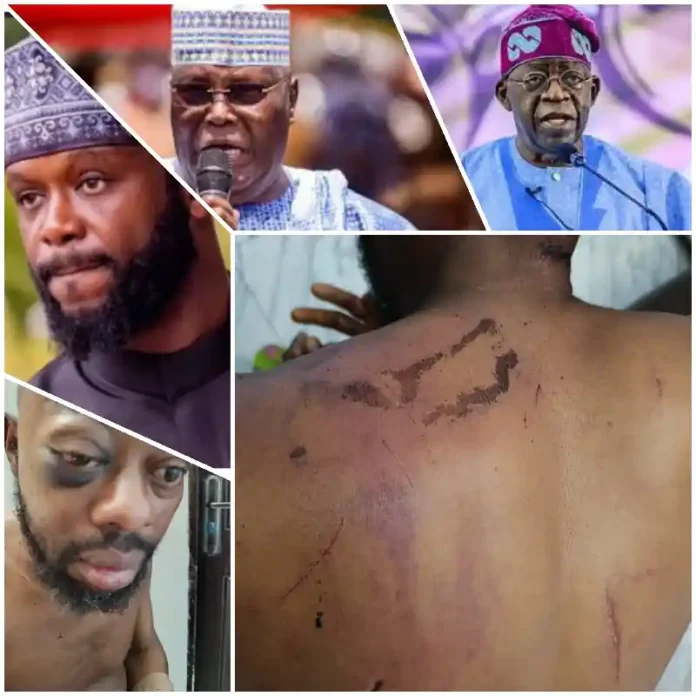NANS President Accuses Seyi Tinubu of Assault, Abduction; Atiku Demands Immediate Action
In a strongly worded statement, former Vice President Atiku Abubakar has called on President Bola Tinubu to rein in his son, Seyi Tinubu, following serious allegations of coercion, violence, and intimidation against the President of the National Association of Nigerian Students (NANS), Comrade Atiku Isah.
Atiku, who was the Peoples Democratic Party (PDP) presidential candidate in the 2023 elections, described the allegations as “deeply alarming” and a threat to Nigeria’s democratic values. He emphasized that the presidency is a public trust, not a family inheritance, and warned against the growing trend of political power consolidation through intimidation.
This news article delves into the details of the allegations, Atiku’s response, the implications for Nigeria’s democracy, and the broader conversation about political accountability and civil liberties.
The Allegations Against Seyi Tinubu
The controversy began when Comrade Atiku Isah, the NANS President, accused Seyi Tinubu, the son of President Bola Tinubu, of orchestrating his abduction, physical assault, and attempted inducement. According to Isah, the incident occurred after he made critical remarks about the Tinubu administration’s policies affecting Nigerian students.
Isah claimed that he was ambushed, beaten, and pressured to retract his statements. He further alleged that security agencies were complicit in the attack, raising concerns about the misuse of state power to suppress dissent.
Also Read : Abducted NANS President Exposes Seyi Tinubu: “I Was Stripped, Tortured After Rejecting N100m Bribe
These allegations have sparked outrage among civil society groups, student bodies, and opposition politicians, who view the incident as an attack on freedom of speech and democratic rights.
Atiku’s Stern Warning to Tinubu
In a statement titled “Tinubu Must Call His Family to Order: Nigeria Is Not a Private Estate,” Atiku Abubakar condemned the alleged actions of Seyi Tinubu and called for an immediate investigation.
Key Points from Atiku’s Statement:
- Threat to Democracy: Atiku described the allegations as a direct attack on democratic norms and civil liberties. He warned that Nigeria is not a monarchy where power is inherited, but a democratic republic where leaders must be accountable.
- Rejection of Intimidation Tactics: The former Vice President stated that using violence, bribes, or coercion to silence critics is unacceptable—especially when involving members of the first family.
- Demand for Independent Investigation: Atiku called for an impartial probe into the allegations, expressing concern that security agencies may have been compromised in the incident.
- Warning Against Harm to Comrade Isah: Atiku issued a stern warning, stating that any harm befalling the NANS President would not go unchallenged.
- Denial of Political Link: Atiku clarified that his meeting with Comrade Isah was strictly about education reform and student welfare, dismissing attempts to politicize the issue.
Broader Implications for Nigeria’s Democracy
The allegations against Seyi Tinubu and Atiku’s response raise critical questions about Nigeria’s political climate:
1. Growing Culture of Impunity
If the allegations are true, they suggest a dangerous trend where individuals close to power act with impunity, using force to suppress opposition. This undermines the rule of law and erodes public trust in governance.
2. Weaponization of State Institutions
The alleged involvement of security agencies in the incident points to a possible abuse of state power. When law enforcement becomes a tool for political intimidation, democracy is at risk.
3. The Presidency as a Public Trust, Not a Family Estate
Atiku’s statement reinforces the principle that political leadership is a public service, not a hereditary entitlement. The idea of a “ruling family” contradicts democratic values and could lead to authoritarian tendencies.
4. The Role of Civil Society and Student Activism
NANS has historically been a vocal advocate for students’ rights and good governance. An attack on its leadership sends a chilling message to other civil society groups, discouraging dissent and activism.
Public Reactions and Political Fallout
The allegations have triggered widespread reactions:
- Student Unions: NANS and other student groups have vowed to protest if no action is taken.
- Opposition Parties: The PDP and Labour Party have backed Atiku’s call for an investigation.
- Human Rights Organizations: Groups like Amnesty International and SERAP have demanded accountability.
- Presidency’s Response: As of now, the presidency has not issued an official statement, but sources suggest that Seyi Tinubu denies the allegations.
Historical Context: Political Dynasties in Nigeria
This incident is not isolated. Nigeria has seen cases where political families exert excessive influence:
- The Abacha Era: Family members were accused of looting public funds.
- The Obasanjo Presidency: His son was linked to controversial business deals.
- The Jonathan Administration: Relatives faced corruption allegations.
Atiku’s warning reflects concerns that Nigeria may be sliding toward a system where political power is concentrated within a few families, undermining meritocracy and fair competition.
A Call for Accountability and Democratic Integrity
Atiku Abubakar’s statement is more than a political rebuke—it is a defense of Nigeria’s democracy. The allegations against Seyi Tinubu, if proven true, represent a serious breach of ethical governance and the rule of law.
President Tinubu must address these claims transparently to avoid further erosion of public confidence. Nigeria’s democracy thrives when leaders uphold justice, not when power is wielded as a family inheritance.
The international community, civil society, and all well-meaning Nigerians must remain vigilant against any form of political intimidation. The future of Nigeria’s democracy depends on accountability, transparency, and respect for civil liberties.
Final Thoughts
As this story develops, the key questions remain:
- Will there be an independent investigation?
- How will the Tinubu administration respond?
- Will this incident lead to broader reforms in political accountability?
One thing is clear: Nigeria’s democracy must not be taken for granted. The voices of students, activists, and opposition leaders must be protected, not silenced.
What are your thoughts on this issue? Share your comments below!













